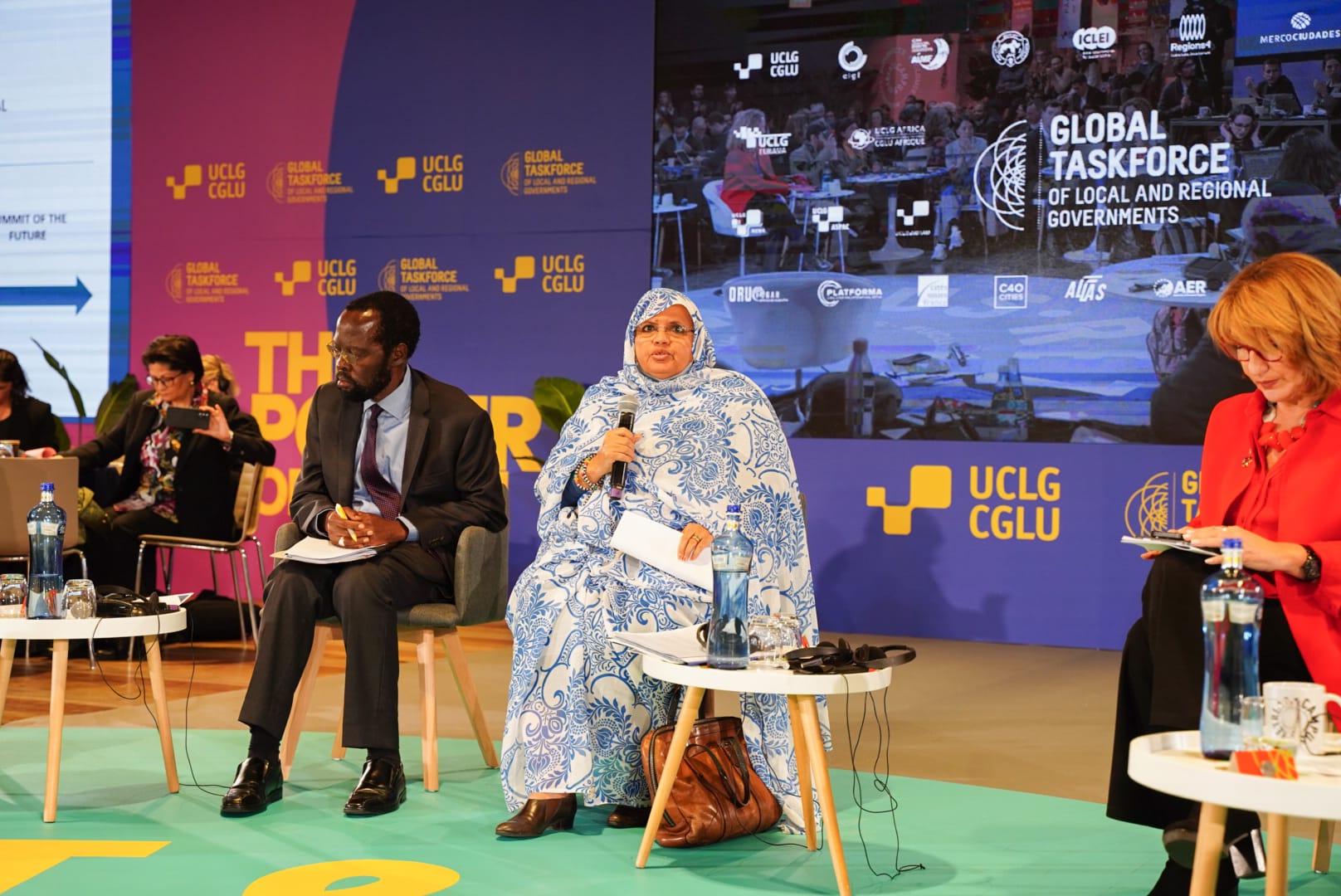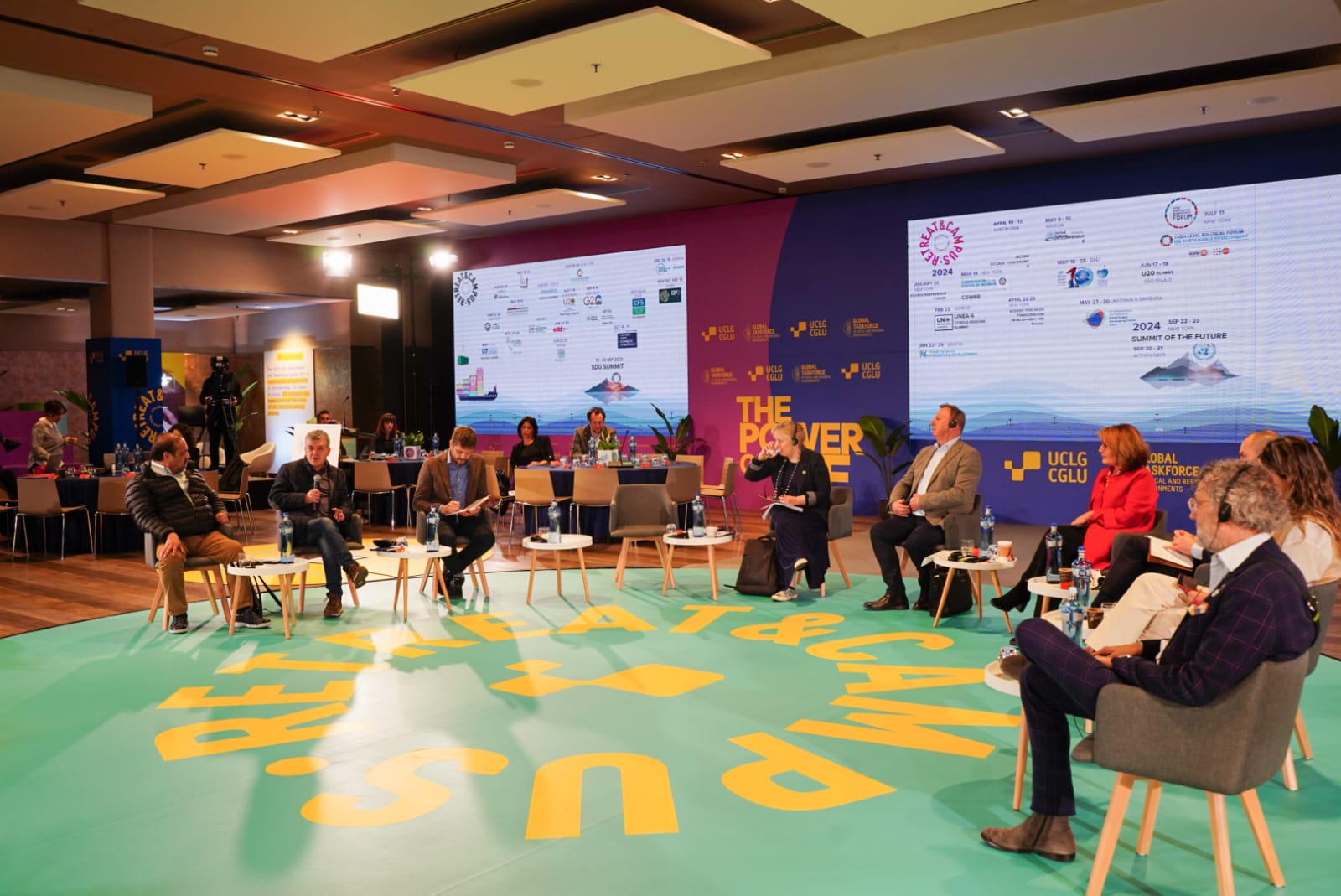The Global Taskforce Day, the second day of the 2024 UCLG Retreat, focused on the main multilateral milestones in 2024, particularly in the work of the UN Secretary-General Advisory Group on Local and Regional Governments and the Summit of the Future.
Since its inception in 2013, the Global Taskforce has gathered the organised constituency of local and regional governments and has worked as one to enhance its political representation in the international sphere, e developing joint policy products and reinforcing in-depth policy dialogues in UN Processes. This path towards alignment has been consolidated since Habitat III, particularly in the past five years, by securing spaces for local and regional governments in critical processes such as the High-Level Political Forum, the two SDG Summits and through convening the World Assembly of Local and Regional Governments, the critical review and follow-up mechanism of the New Urban Agenda. It is also worth mentioning the crucial achievements in acknowledging and recognising the local and regional governments’ work in the Climate Change Agreements and the increased momentum of the localisation strategy within the UN sphere.
With the Summit of the Future as the 2024 political and policy target, the Global Taskforce focused on the work carried out by the United Nations Secretary-General Advisory Group on Local and Regional Governments, highlighting the progress made towards the United Nations’ Pact for the Future and other important milestones. Representatives of the UNSG Advisory Group gathered in the meeting of the Global Taskforce to discuss the strategy towards the Summit and share the work done in the past months.
Emilia Saiz, the Secretary-General of UCLG, introduced the day emphasising the importance of strategic input for the upcoming UN Summit of the Future, stressing the need for explicit reference to local governments and localisation in policy drafts. While the Zero Draft of the outcome document does not include the suggested references from the Advisory Group, there are still opportunities for influence, including engagement with the mayor group at the UN and direct input through stakeholder meetings.
Fatimetou Abdel Malick, President of Nouakchott & UCLG, Co-President and co-chair of the UNSG Advisory Group, reported on the work of the Advisory Group. She underscored the need for a formal mechanism to ensure continuous representation of Local and Regional Governments (LRGs) beyond the Summit of the Future. In addition, she introduced the three proposed mechanisms for LRGs to access the UN System directly.
The first proposed option is to strengthen the advisory committee/ group of the LRGs to the UN Secretary-General. The second option is to establish an LRG Mechanism – coordinating space to ensure the LRG Mechanism stays independent and self-organised. This will allow the LRGs to advise the General Assembly, ECOSOC, and the UN Secretariat. The last option involves establishing the LRG Committee – a subsidiary organ of ECOSOC. This is inspired by the Committee of Regions of the EU and would allow the institutionalisation of the LRG within the UN.

Reaffirming the idea of having a formal, permanent space for local governments within the UN system, Paola Pabón, the Prefect of Pichincha, Vice President of UCLG for the Forum of Regions and member of the UNSG Advisory Group, stressed the importance of defining the characteristics of this space to protect and advance the interests of local governments on the global stage.
The Governor of Kisumu and member of the UNSG Advisory group, Peter Anyang’ Nyong’o, called for a concerted effort to develop effective strategies. He stressed that “we do not need to convince ourselves any more that we need representation at the UN” and further highlighted the pivotal role of local governments as representatives of the people. The Governor further emphasised the need for a pressure group in New York to advocate for their interests.
Echoing the statement made by previous speakers, Arnaud Ngatcha, Deputy Mayor of the City of Paris, stressed the need for collaborative work. He further noted that “Nobody gives us the power. We have to go and get it… We must find our place in the Summit of the Future and follow our clear agenda.”
Gino Van Begin, Secretary-General of ICLEI, urged attendees to seize the opportunity presented by the UN Secretary-General’s interest in enhancing partnerships with local governments. He emphasised the importance of showcasing the value of local government initiatives as local governments are “the best self-organised UN Constituency; this is our strength.” He further advocated for a dedicated mechanism linking LRGs to the UN General Assembly.
The importance of broad regional representation and advocated focusing on regional balance in UN discussions was underscored by Carles Llorens, the Secretary-General of ORU Fogar. He emphasised the need for strong advocacy to ensure adequate recognition and resources for regional governments. Moreover, he also stressed the importance of solid regional governments with a specific budget and territorial equilibrium.
Fabiana Goyeneche, Director of International Relations of the Municipality of Montevideo, emphasised the value of flexibility and strategic planning in advancing the agenda of local governments within the UN. She called for coordinated efforts to identify allies and establish a roadmap for future engagements.
The Mayor of Heidelberg, Eckart Würzner, underscored and affirmed the importance of working with partners at all levels, especially on urgent agendas such as climate change. He called on showing national governments why LRGs are part of the conversation by setting up their agenda as cities through networks such as the Global Covenant of Mayors for Climate and Local Governments for Sustainability.
Henry Hall, Principal Policy Officer of the Greater London Authority, stressed that, despite the limitation in their competencies, city regions and local governments are often leading the way beyond national government standards. He also encouraged continued engagement towards the Summit of the Future and sharing experience and expertise between cities.
The discussion underscored the determination of local and regional government representatives to secure a formal and influential role within the UN System. While challenges lie ahead, the consensus among attendees was clear: local governments must continue to advocate for their interests and leverage their unique contributions to global sustainability and development.


 This publication was produced with the financial support of the European Union. Its contents are the sole responsibility of UCLG and do not necessarily reflect the views of the European Union.
This publication was produced with the financial support of the European Union. Its contents are the sole responsibility of UCLG and do not necessarily reflect the views of the European Union.